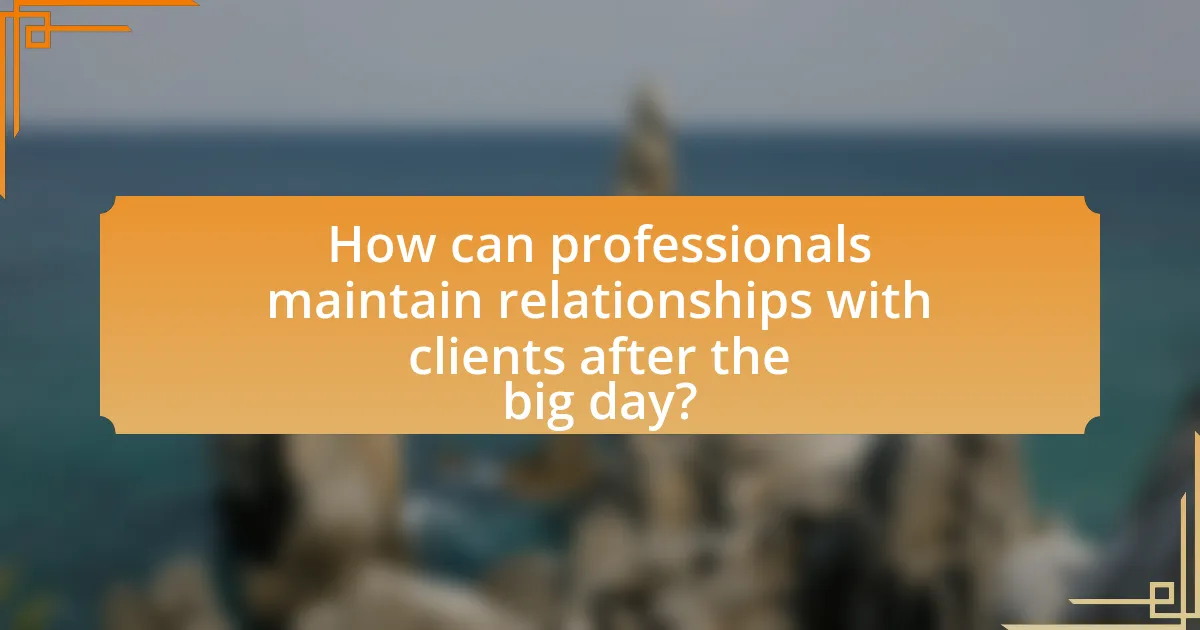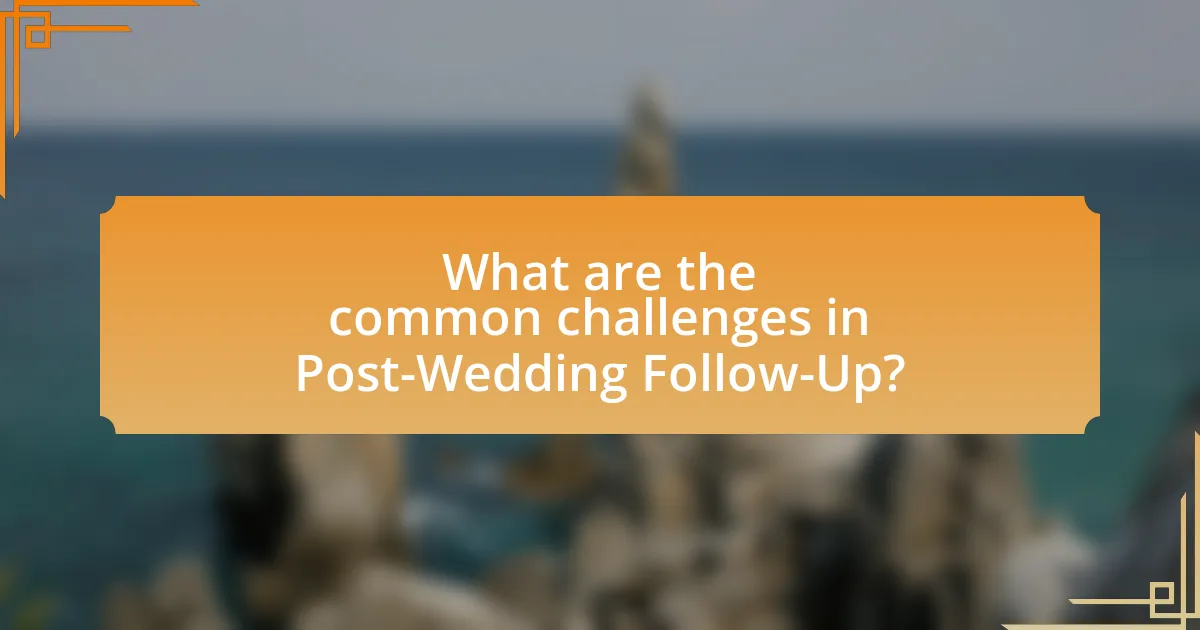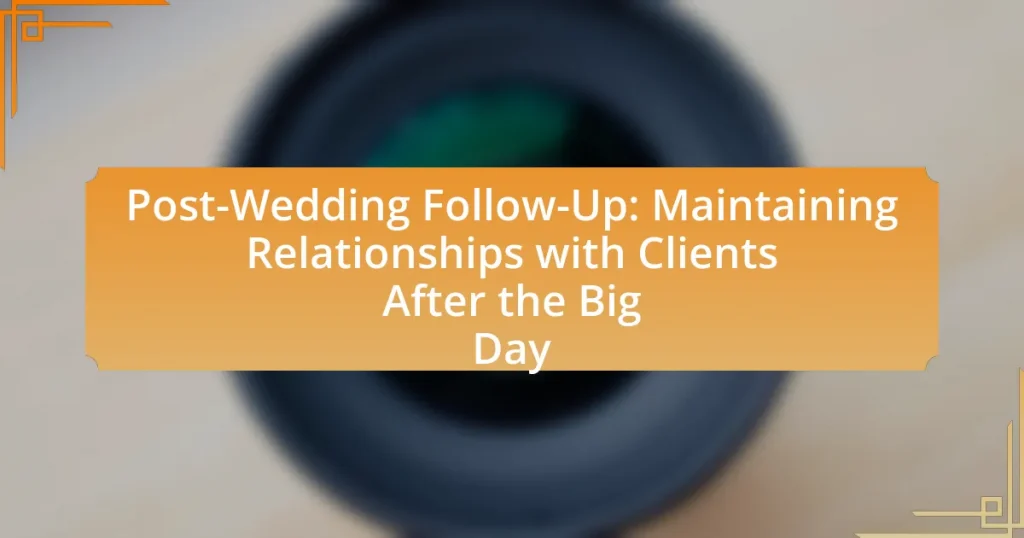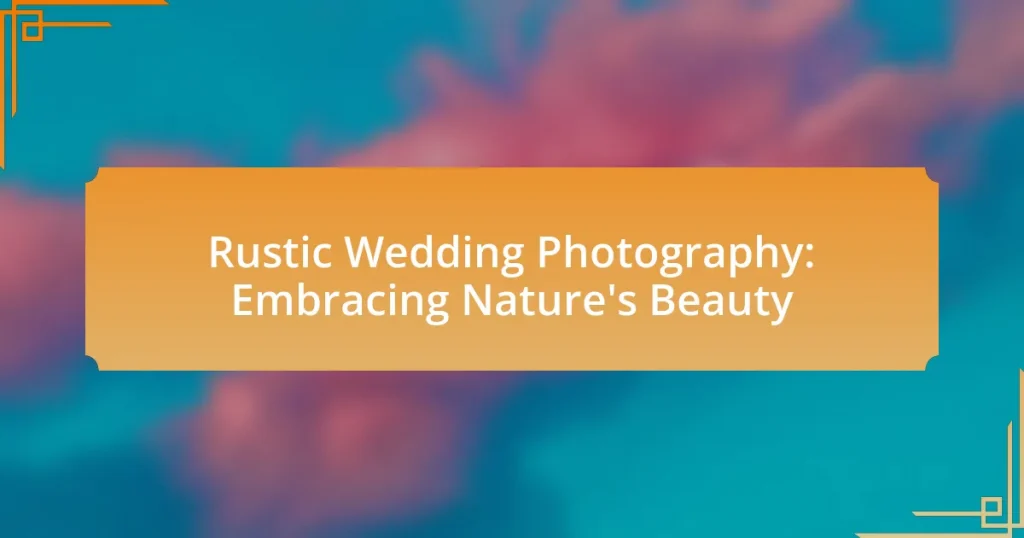Post-wedding follow-up refers to the actions taken by wedding vendors to maintain relationships with clients after the wedding event. This process includes sending thank-you notes, requesting feedback, sharing professional photos, and offering future services. Effective follow-up is crucial for enhancing client satisfaction and fostering loyalty, as it can lead to referrals and repeat business. Key components of successful follow-up include timely communication, personalized messages, and utilizing various methods such as email and social media. The article also addresses common challenges in maintaining client relationships and outlines best practices for effective post-wedding engagement.

What is Post-Wedding Follow-Up?
Post-wedding follow-up refers to the actions taken by wedding vendors to maintain relationships with clients after the wedding event. This process typically includes sending thank-you notes, requesting feedback on services, sharing professional photos, and offering future services or referrals. Research indicates that effective follow-up can enhance client satisfaction and lead to referrals, as 70% of clients are likely to recommend a vendor who maintains communication after the event.
Why is Post-Wedding Follow-Up important for client relationships?
Post-wedding follow-up is important for client relationships because it fosters ongoing communication and strengthens the bond between the service provider and the client. This practice allows service providers to express gratitude, gather feedback, and address any concerns, which can enhance client satisfaction and loyalty. Research indicates that maintaining relationships post-event can lead to referrals and repeat business, as satisfied clients are more likely to recommend services to others. Therefore, effective post-wedding follow-up not only solidifies the initial relationship but also contributes to long-term business success.
How does effective follow-up enhance client satisfaction?
Effective follow-up enhances client satisfaction by demonstrating attentiveness and commitment to the client’s needs. When businesses engage in timely and personalized follow-up communication, they reinforce the value of the service provided, which can lead to increased trust and loyalty. Research indicates that 70% of customers say they are more likely to return to a business that provides excellent follow-up service. This proactive approach not only addresses any concerns or feedback but also fosters a sense of appreciation, making clients feel valued and understood.
What role does follow-up play in client retention?
Follow-up plays a crucial role in client retention by reinforcing relationships and demonstrating ongoing value. Regular follow-up communication helps to keep clients engaged, shows that their satisfaction is a priority, and can lead to repeat business and referrals. Research indicates that businesses that maintain consistent follow-up with clients can increase retention rates by up to 30%, highlighting the effectiveness of this strategy in fostering loyalty and trust.
What are the key components of a successful Post-Wedding Follow-Up?
The key components of a successful post-wedding follow-up include timely communication, personalized thank-you notes, sharing professional photos, and soliciting feedback. Timely communication ensures that clients feel valued and appreciated shortly after their event, which can strengthen the relationship. Personalized thank-you notes add a special touch, showing clients that their specific contributions and presence were meaningful. Sharing professional photos allows clients to relive their special day and can serve as a marketing tool for the vendor. Soliciting feedback helps vendors improve their services and demonstrates a commitment to client satisfaction. These components collectively enhance client relationships and can lead to referrals and repeat business.
What methods can be used for follow-up communication?
Methods for follow-up communication include email, phone calls, social media messages, and personalized thank-you notes. Email allows for detailed communication and can include photos or links to services, while phone calls provide a personal touch and immediate feedback. Social media messages enable ongoing engagement and sharing of memories, and personalized thank-you notes create a lasting impression and strengthen relationships. These methods are effective in maintaining connections with clients after the wedding, fostering loyalty and encouraging referrals.
How can personalized messages improve follow-up effectiveness?
Personalized messages significantly enhance follow-up effectiveness by fostering a deeper emotional connection with clients. When messages are tailored to individual preferences and experiences, they demonstrate attentiveness and care, which can lead to increased client satisfaction and loyalty. Research indicates that personalized communication can improve response rates by up to 29%, as clients feel more valued and understood. This approach not only strengthens relationships but also encourages referrals and repeat business, essential for sustaining long-term client engagement in the post-wedding context.

How can professionals maintain relationships with clients after the big day?
Professionals can maintain relationships with clients after the big day by implementing regular follow-ups and personalized communication. This approach fosters ongoing engagement and demonstrates continued interest in the client’s satisfaction. For instance, sending a thank-you note or a personalized message a few weeks after the event can reinforce the connection. Research indicates that 70% of clients prefer to receive follow-up communication, which can include sharing photos or offering future services, thereby enhancing client loyalty and encouraging referrals.
What strategies can be implemented for ongoing engagement?
To maintain ongoing engagement with clients after their wedding, personalized follow-up communication is essential. This can include sending thank-you notes, sharing professional photos, or offering anniversary discounts. Research indicates that personalized interactions significantly enhance client satisfaction and loyalty, with 80% of consumers more likely to engage with brands that provide personalized experiences. Additionally, hosting reunion events or creating exclusive online communities for past clients fosters a sense of belonging and encourages continued interaction. These strategies not only strengthen relationships but also increase the likelihood of referrals and repeat business.
How can social media be leveraged for client interaction?
Social media can be leveraged for client interaction by creating engaging content that encourages communication and feedback. Platforms like Instagram and Facebook allow businesses to share photos, videos, and stories that resonate with clients, fostering a sense of community. For instance, a wedding photographer can post highlights from a couple’s wedding day, prompting the couple and their guests to comment and share their experiences. This interaction not only strengthens the relationship but also enhances brand visibility through shares and likes. According to a study by Sprout Social, 70% of consumers feel more connected to brands when they engage with them on social media, demonstrating the effectiveness of these platforms in maintaining client relationships post-wedding.
What types of content can be shared to keep clients engaged?
To keep clients engaged after their wedding, sharing personalized content such as thank-you notes, wedding highlights videos, and curated photo albums is effective. Personalized thank-you notes express appreciation and strengthen emotional connections, while wedding highlights videos allow clients to relive their special day, enhancing their experience. Curated photo albums provide a tangible keepsake that clients can share with family and friends, fostering ongoing engagement. According to a study by WeddingWire, 75% of couples appreciate receiving follow-up content from their wedding vendors, indicating that such engagement strategies are well-received and beneficial for maintaining relationships.
How can feedback be utilized in Post-Wedding Follow-Up?
Feedback can be utilized in post-wedding follow-up by gathering insights from clients about their experience, which helps improve services and strengthen relationships. Collecting feedback through surveys or direct communication allows wedding vendors to understand client satisfaction levels and identify areas for enhancement. For instance, a study by WeddingWire found that 90% of couples value vendor feedback, indicating that addressing concerns can lead to repeat business and referrals. By actively engaging with clients post-event, vendors can demonstrate commitment to quality service, fostering long-term relationships and enhancing their reputation in the industry.
What are effective ways to gather client feedback?
Effective ways to gather client feedback include using surveys, conducting interviews, and leveraging social media platforms. Surveys, particularly those sent via email shortly after the service, can yield quantitative data on client satisfaction, with studies showing that 70% of clients prefer this method for feedback collection. Conducting interviews allows for in-depth qualitative insights, enabling clients to express their thoughts and feelings about the service. Additionally, monitoring social media platforms can provide real-time feedback and engagement, as 54% of consumers share their experiences online. These methods collectively ensure a comprehensive understanding of client perspectives and help maintain relationships post-wedding.
How can feedback improve future services and client relationships?
Feedback enhances future services and client relationships by providing actionable insights that inform improvements and foster trust. When clients share their experiences, businesses can identify strengths and weaknesses in their offerings, allowing for targeted enhancements. For instance, a study by the Harvard Business Review found that companies that actively seek and respond to customer feedback can increase customer retention rates by up to 15%. This responsiveness not only improves service quality but also demonstrates to clients that their opinions are valued, thereby strengthening the relationship.

What are the common challenges in Post-Wedding Follow-Up?
Common challenges in post-wedding follow-up include maintaining communication, managing client expectations, and addressing feedback effectively. After the wedding, vendors often struggle to keep in touch with clients, leading to missed opportunities for referrals and repeat business. Additionally, clients may have varying expectations regarding follow-up timelines and the nature of communication, which can create misunderstandings. Addressing feedback, whether positive or negative, is crucial but can be difficult, as vendors must navigate emotional responses and ensure that clients feel heard and valued. These challenges can hinder relationship-building and impact future business prospects.
What obstacles do professionals face in maintaining client relationships?
Professionals face several obstacles in maintaining client relationships, including communication breakdowns, time constraints, and differing expectations. Communication breakdowns can occur due to misunderstandings or lack of regular updates, which can lead to clients feeling neglected. Time constraints often hinder professionals from dedicating sufficient attention to follow-up interactions, especially in busy periods. Additionally, differing expectations between professionals and clients regarding post-wedding services can create friction, as clients may anticipate ongoing support that professionals may not be prepared to provide. These factors collectively challenge the sustainability of client relationships in the post-wedding context.
How can time constraints affect follow-up efforts?
Time constraints can significantly hinder follow-up efforts by limiting the time available for personalized communication and relationship-building with clients. When wedding professionals face tight schedules, they may resort to generic messages instead of tailored follow-ups, which can diminish the perceived value of their services. Research indicates that timely and personalized follow-ups can enhance client satisfaction and loyalty, as clients feel more valued when they receive attention specific to their experience. Therefore, inadequate time for follow-up can lead to missed opportunities for strengthening client relationships and securing future referrals.
What strategies can overcome communication barriers?
Effective strategies to overcome communication barriers include active listening, clear and concise messaging, and utilizing multiple communication channels. Active listening ensures that all parties feel heard and understood, which fosters a more open dialogue. Clear and concise messaging minimizes misunderstandings by conveying information in a straightforward manner. Utilizing multiple communication channels, such as email, phone calls, and social media, accommodates different preferences and enhances accessibility. Research indicates that effective communication practices can significantly improve client satisfaction and retention, which is crucial in maintaining relationships after significant events like weddings.
How can professionals measure the success of their follow-up efforts?
Professionals can measure the success of their follow-up efforts by analyzing client engagement metrics, such as response rates and feedback scores. For instance, tracking the percentage of clients who respond to follow-up emails or surveys provides quantitative data on engagement levels. Additionally, monitoring repeat business or referrals generated from follow-up interactions serves as a strong indicator of relationship maintenance and client satisfaction. According to a study by the Harvard Business Review, increasing customer retention by just 5% can lead to a profit increase of 25% to 95%, highlighting the importance of effective follow-up in fostering long-term client relationships.
What metrics should be tracked to evaluate follow-up effectiveness?
To evaluate follow-up effectiveness in post-wedding client relationships, key metrics include response rate, engagement level, and client satisfaction scores. The response rate measures how many clients reply to follow-up communications, indicating their interest and engagement. Engagement level can be assessed through metrics such as the frequency of interactions or social media engagement, reflecting the strength of the relationship. Client satisfaction scores, often gathered through surveys, provide direct feedback on the clients’ experiences and perceptions of the follow-up process. Tracking these metrics allows businesses to refine their follow-up strategies and enhance client relationships effectively.
How can client satisfaction surveys inform follow-up strategies?
Client satisfaction surveys can inform follow-up strategies by providing direct feedback on clients’ experiences and preferences. This feedback allows businesses to identify areas for improvement and tailor their follow-up communications to address specific client needs. For instance, if a survey reveals that clients appreciated timely responses but felt the service could be more personalized, follow-up strategies can be adjusted to include personalized messages and quicker response times. Research shows that 70% of customers are more likely to remain loyal to a brand that listens and responds to their feedback, highlighting the importance of using survey data to enhance client relationships post-wedding.
What are the best practices for Post-Wedding Follow-Up?
The best practices for post-wedding follow-up include sending thank-you notes, sharing professional photos, and requesting feedback. Sending personalized thank-you notes to guests and vendors within a few weeks of the wedding fosters goodwill and strengthens relationships. Sharing professional photos with guests not only expresses gratitude but also encourages them to share their experiences on social media, enhancing your visibility. Requesting feedback from clients about their experience can provide valuable insights for future improvements and demonstrates a commitment to customer satisfaction. These practices are supported by industry standards, which emphasize the importance of maintaining connections to encourage referrals and repeat business.
How can timely follow-up enhance client relationships?
Timely follow-up enhances client relationships by demonstrating attentiveness and commitment to client satisfaction. When businesses reach out promptly after a service, such as a wedding, it reinforces the connection and shows clients that their experience is valued. Research indicates that 70% of clients prefer to receive follow-up communication within a week after a service, as it fosters trust and loyalty. Additionally, consistent follow-up can lead to increased referrals; satisfied clients are more likely to recommend services to others, thereby expanding the client base.
What role does consistency play in maintaining client connections?
Consistency is crucial in maintaining client connections as it fosters trust and reliability. When clients receive regular communication and consistent service, they feel valued and understood, which strengthens their loyalty. Research indicates that 70% of clients prefer consistent engagement from service providers, as it enhances their overall experience and satisfaction. This ongoing interaction not only keeps the relationship alive but also encourages referrals and repeat business, demonstrating the significant impact of consistency on client retention.



